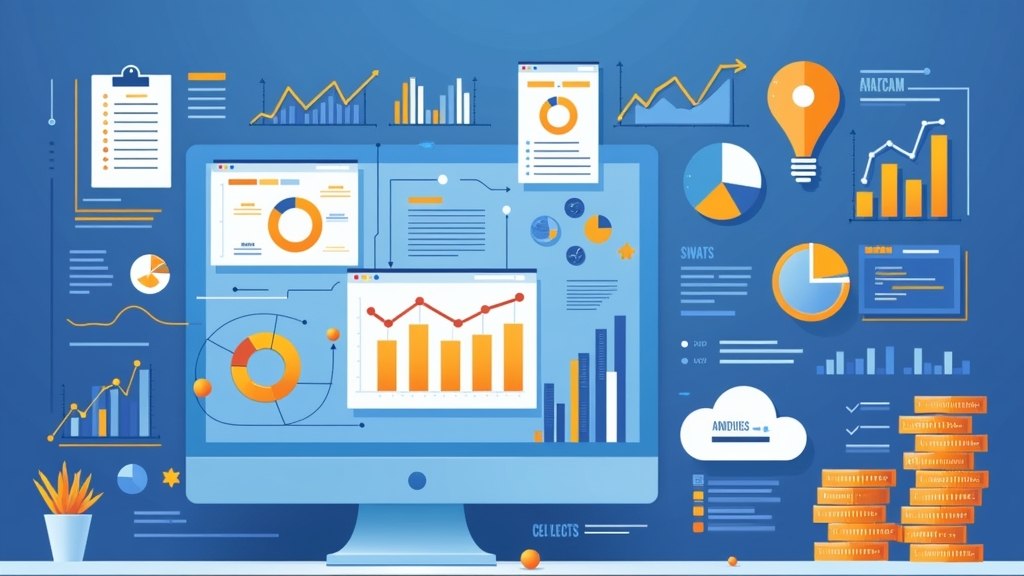Marketing – Advanced Analytics Reporting: Unlocking the Power of Data
Introduction
In today’s fast-paced marketing world, understanding advanced analytics is crucial. It allows you to make informed decisions based on data rather than guesswork. Advanced analytics helps you uncover trends, customer behaviors, and market opportunities that can significantly impact your strategies. Reporting these insights effectively is equally important; it ensures that all stakeholders understand the data’s implications and can act accordingly. By mastering advanced analytics reporting, you can unlock the full potential of your marketing efforts and drive business growth.
Understanding Advanced Analytics in Marketing
Advanced analytics in marketing refers to using sophisticated techniques to analyze data beyond traditional methods. This includes predictive modeling, machine learning algorithms, and statistical analysis. These tools help marketers identify patterns and predict future outcomes based on historical data.
The importance of reporting in marketing strategies cannot be overstated. Effective reporting transforms raw data into actionable insights. It helps you track campaign performance, understand customer preferences, and optimize resource allocation. When done right, reporting provides clarity for decision-makers and aligns teams towards common goals.
Key Components of Advanced Analytics Reporting
Data Collection Methods
Data collection is the first step in advanced analytics reporting. You can gather data through various methods such as surveys, website tracking tools, social media monitoring, and CRM systems. Each method has its strengths; for instance, surveys provide direct feedback from customers while web tracking reveals user behavior online.
Data Processing Techniques
Once collected, the next step involves processing this data to extract meaningful insights. Techniques like data cleaning ensure accuracy by removing errors or duplicates. Data transformation may also be necessary to convert raw information into a usable format for analysis.
Key Performance Indicators (KPIs) to Track
To measure success effectively, it’s essential to define key performance indicators (KPIs). Common KPIs include conversion rates, customer acquisition costs (CAC), return on investment (ROI), and customer lifetime value (CLV). Tracking these metrics allows you to assess how well your marketing strategies are performing over time.
Tools and Technologies for Advanced Analytics
Popular Analytics Platforms and Software
Several platforms facilitate advanced analytics reporting in marketing today. Google Analytics offers robust features for tracking website performance while HubSpot provides comprehensive CRM capabilities with integrated analytics tools. Other popular options include Tableau for visualization and Adobe Analytics for deep insights into customer behavior.
Integrating AI and Machine Learning in Reporting
Artificial intelligence (AI) and machine learning are revolutionizing how we approach analytics reporting. These technologies enable automated analysis of large datasets quickly and accurately—identifying trends that might go unnoticed otherwise. By integrating AI into your reporting processes, you can enhance predictive capabilities and improve decision-making efficiency.
Best Practices for Effective Advanced Analytics Reporting
Customizing Reports for Different Stakeholders
Not everyone needs the same information from reports; therefore, customizing them based on stakeholder needs is vital. For example, executives may prefer high-level summaries focusing on ROI while team members might need detailed breakdowns of campaign performance metrics.
Visualizing Data for Better Insights
Data visualization plays a critical role in making complex information understandable at a glance. Using charts or graphs makes it easier to spot trends or anomalies within your dataset quickly—enabling faster decision-making across teams.
Challenges in Advanced Analytics Reporting
Common Pitfalls and How to Avoid Them
Despite its benefits, there are challenges associated with advanced analytics reporting that marketers must navigate carefully—such as overcomplicating reports or failing to communicate findings clearly among teams effectively leads often leads confusion rather than clarity! To avoid these pitfalls prioritize simplicity when presenting results!
Ensuring Data Quality and Accuracy
Another significant challenge lies in ensuring the quality & accuracy of collected datasets! Inaccurate or incomplete information could skew results leading poor decisions down line! Regular audits should be conducted verify integrity throughout entire process—from collection through processing final output!
Case Studies: Successful Implementation of Advanced Analytics Reporting
Industry-Specific Examples
Many companies have successfully implemented advanced analytics reporting strategies tailored specifically their industries! For instance retail giants use predictive models forecast inventory needs based seasonal trends while financial institutions leverage real-time analysis detect fraudulent activities swiftly!
Lessons Learned from Real-World Applications
These case studies reveal valuable lessons about best practices when implementing such systems—for example collaboration between departments enhances overall effectiveness ensuring everyone understands objectives behind each report generated!
Future Trends in Advanced Analytics Reporting
Emerging Technologies Shaping the Future
As technology continues evolving new tools will emerge further enhancing capabilities around analyzing vast amounts information efficiently! Innovations like blockchain could improve transparency security surrounding transactions providing even greater confidence stakeholders involved process!
Predictions for Marketing Analytics
Looking ahead experts predict increased reliance upon automation artificial intelligence within realm digital marketing allowing businesses not only streamline operations but also gain deeper insights consumer behavior ultimately driving growth profitability long term basis!
Conclusion
In summary understanding leveraging power behind advanced analytical reports crucial modern-day marketer striving achieve success competitive landscape today’s marketplace requires continuous adaptation evolution practices employed stay ahead curve! Embracing these methodologies empowers organizations harness true potential available through effective utilization gathered insights ultimately fostering sustainable growth development future endeavors undertaken collectively across sectors alike!
📢 Explore More: Continue Your Journey!
If this article helped you understand more about advanced analytics reporting in marketing strategies check out The Role of Big Data in Modern Marketing! It covers how big data influences decision-making processes helping marketers optimize their campaigns more effectively.














![NEEWER 55W 18"/45cm Ring Light Kit [New Version], 5600K Dimmable ...](https://m.media-amazon.com/images/I/414QLqvZWLL._AC_.jpg)








